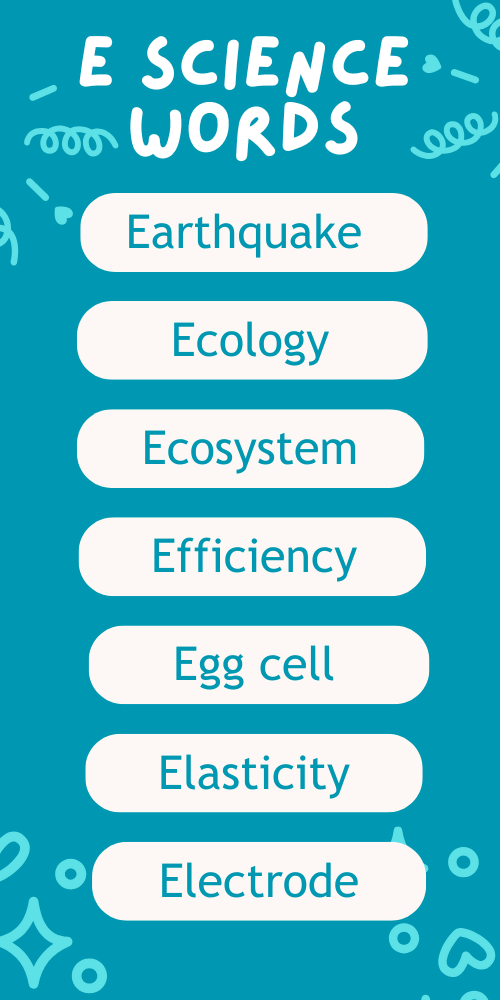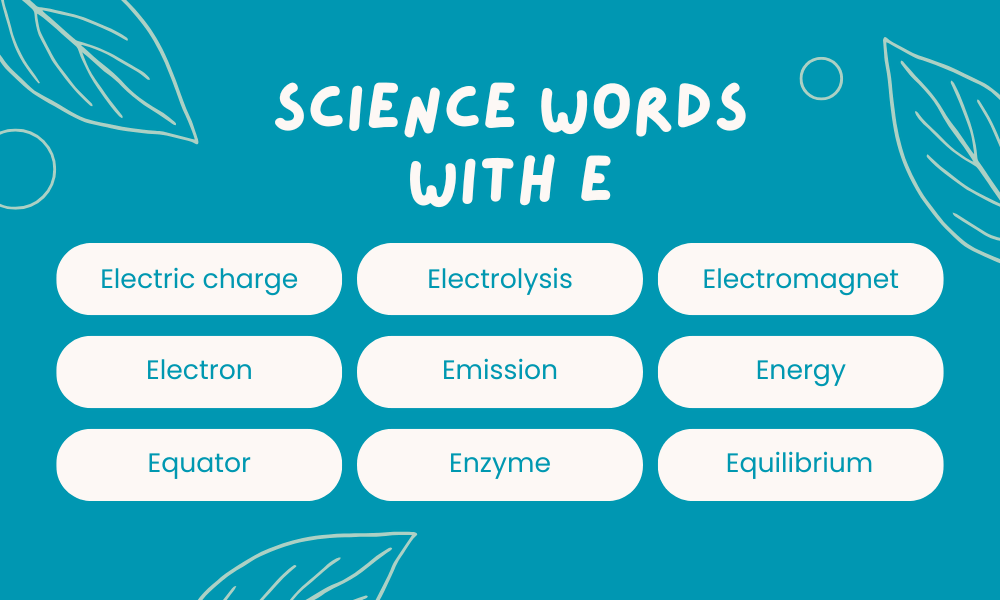Science Words That Start With E | Easy List for Students

Embarking on a journey through the alphabet of science, the letter “E” stands out as both elementary and extraordinary, capturing concepts that shape our understanding of the natural world and technological progress. From ecology, which explores the delicate balance of ecosystems, to electrons, the tiny particles that power chemistry and physics, science is full of essential “E” terms. These words, whether simple or complex, open doors to discoveries about life, matter, and the universe. This guide brings together key scientific terms beginning with “E,” explained in clear, easy-to-understand language which makes the wonders of science accessible for learners of all ages.
Easy Science Words With E for Students
- Earth – The planet we live on.
- Energy – The power to make things move or work.
- Egg – A cell from which a new animal can grow.
- Experiment – A test to learn or prove something.
- Electricity – The flow of electric charge that powers lights and machines.
- Environment – The world around us, including air, water, and land.
- Eye – The organ that helps us see.
- Ear – The organ that helps us hear.
- Ecosystem – A community of living things and their surroundings.
- Evaporation – When liquid turns into gas, like water into vapor.
- Element – A pure substance made of only one kind of atom.
- Earthquake – Shaking of the ground caused by movement inside Earth.
- Engineer – A person who designs and builds useful things.
- Erosion – Wearing away of rocks and soil by wind, water, or ice.
- Enzyme – A protein in living things that speeds up chemical reactions.

Physics Science Words That Start With E
- Electricity – Movement of electric charges.
- Electromagnetism – The interaction between electric currents and magnetic fields.
- Energy – The ability to do work.
- Elasticity – The ability of a material to return to its shape after being stretched.
- Equilibrium – A state where forces are balanced.
- Expansion – Increase in size, often when heated.
- Electron – A tiny particle with a negative charge inside atoms.
- Electrostatics – The study of electric charges at rest.
- Emission – Release of energy, light, or particles.
- Entropy – A measure of disorder in a system.
- Einstein’s Theory of Relativity – Explains how space, time, and gravity are connected.
- Electromotive Force (EMF) – The energy that pushes electric current in a circuit.
- Echo – Reflection of sound waves.
- Eddy Current – Circulating currents caused in conductors by changing magnetic fields.
- Equator (Physics of Earth) – Imaginary line around Earth important in rotational studies.
Chemistry Science Words That Start With E
- Element – A substance made of one type of atom.
- Electron – A negatively charged particle in atoms.
- Electrolysis – Breaking substances using electricity.
- Electrolyte – A substance that conducts electricity when dissolved in water.
- Energy Levels – The positions electrons occupy around an atom.
- Enzyme – Biological catalyst for chemical reactions.
- Equilibrium – When forward and backward chemical reactions happen at the same rate.
- Exothermic Reaction – A reaction that gives off heat.
- Endothermic Reaction – A reaction that absorbs heat.
- Ethanol – A type of alcohol often used as fuel or in drinks.
- Ester – Organic compounds with fruity smells.
- Electronegativity – An atom’s ability to attract electrons.
- Emulsion – A mixture of two liquids that don’t normally mix.
- Effusion – Movement of gas through a tiny hole.
- Enthalpy – Heat content of a chemical system.
Biology Science Words That Start With E
- Ecology – Study of how living things interact with their environment.
- Ecosystem – Community of living organisms and their surroundings.
- Evolution – How species change over time.
- Eukaryote – Cells with a nucleus (like animals and plants).
- Endangered Species – Animals or plants at risk of disappearing.
- Embryo – Early stage of development in plants and animals.
- Enzyme – Protein that speeds up body reactions.
- Epidermis – Outer layer of skin or plant cells.
- Excretion – Removal of waste from the body.
- Erythrocyte – Red blood cell that carries oxygen.
- Estrogen – A female hormone.
- Epigenetics – Study of how genes are switched on or off.
- Ecosphere – Another word for the biosphere (life on Earth).
- Endoplasmic Reticulum – Cell structure that makes and transports proteins.
- Euglena – A single-celled organism that can act like both a plant and animal.
Scientific Words Starting With E
| Word | Meaning |
|---|---|
| Ecology | Study of living things and their environment. |
| Energy | Power that makes things happen. |
| Electron | Tiny negative particle in atoms. |
| Ecosystem | Community of living things. |
| Evolution | Process of species changing over time. |
| Element | Basic substance made of one atom type. |
| Elasticity | Ability of materials to return to shape. |
| Equilibrium | Balance in physical or chemical systems. |
| Exothermic | Releases heat. |
| Endothermic | Absorbs heat. |
| Entropy | Measure of disorder. |
| Erosion | Wearing away soil or rock. |
| Eukaryote | Organism with complex cells. |
| Epidemiology | Study of diseases in populations. |
| Engineering | Application of science to build solutions. |
Math Science Words That Start With E
- Equation – A statement showing two things are equal using “=”.
- Exponent – A small number showing how many times to multiply a base.
- Ellipse – An oval shape made by stretching a circle.
- Estimate – A rough calculation or guess.
- Even Numbers – Numbers divisible by 2 (like 2, 4, 6).
- Expression – A math phrase with numbers and symbols (no “=”).
- Extremes – The first and last terms in a ratio.
- Evaluate – To find the value of an expression.
- Equilateral Triangle – A triangle with all sides the same length.
- Edge – The line where two surfaces of a solid shape meet.
- Empty Set – A set with no elements.
- Error – The difference between an exact value and an estimate.
- Euler’s Number (e) – A special constant (~2.718) used in growth and logarithms.
- Equidistant – Points that are the same distance apart.
- Expansion – Multiplying out brackets in algebra.
Earth Science Words Starting With E
- Earthquake – Shaking of the ground caused by Earth’s movement.
- Erosion – Wearing away rocks and soil by wind or water.
- Equator – An imaginary line around the middle of Earth.
- Ecosystem – Living things and their physical environment together.
- Evaporation – Liquid water turning into vapor.
- Eclipse – When the sun or moon is blocked from view.
- Epicenter – The point on Earth’s surface directly above an earthquake’s origin.
- Exosphere – The outermost layer of Earth’s atmosphere.
- Estuary – Where a river meets the sea.
- Environment – The air, land, and water where life exists.
- Earth’s Crust – The outer solid layer of Earth.
- Equinox – The two times in a year when day and night are equal.
- Energy Resources – Natural sources like coal, wind, and sunlight used for power.
- Eolian Processes – Land changes caused by wind.
- Eruption – The release of lava, ash, or gas from a volcano.
Technology and Engineering Words That Start With E
- Electricity – Energy from moving electrons.
- Electronics – Devices that use electric circuits.
- Engine – A machine that converts energy into motion.
- Encoder – A device that changes information into code.
- Encryption – Protecting data by changing it into a secret code.
- Efficiency – How well energy or resources are used.
- Ergonomics – Designing tools and workplaces for comfort and safety.
- Elevator – A vertical transport system in buildings.
- Engineering – Using science and math to design and build.
- Exoskeleton – A robotic suit that supports human movement.
- Electromagnet – A magnet created by electric current.
- Ethernet – A system for connecting computers in a network.
- Embedded System – A computer built into a machine to control it.
- Experimentation – Testing ideas to find solutions.
- Energy Storage – Saving energy for later use (like in batteries).
Forensic Science Words With E
- Evidence – Information used to solve a crime.
- Exoneration – Clearing someone of blame through proof.
- Exhumation – Digging up a buried body for investigation.
- Examination – Careful inspection of crime scene materials.
- Expert Witness – A specialist who testifies in court.
- Explosive Residue – Traces left behind after a blast.
- Eyewitness – A person who saw a crime happen.
- Epidemiology (Forensic) – Studying disease patterns in criminal cases.
- Entomology (Forensic) – Using insects to study time of death.
- Electrostatic Detection – Technique to reveal hidden writing.
- Edge Analysis – Examining torn edges of paper or materials.
- Extraction – Removing DNA or chemicals for study.
- Evidence Chain – The record of who handled the evidence.
- Exemplars – Known samples for comparison (like handwriting).
- Enzyme Markers – Proteins used to identify biological evidence.

General Science Words That Start With E
| Word | Meaning |
|---|---|
| Ecology | Study of living things and their environment. |
| Energy | Power that makes things move or work. |
| Electron | A tiny negative particle in atoms. |
| Ecosystem | Community of living organisms and their surroundings. |
| Evolution | Change in species over time. |
| Element | Pure substance made of one kind of atom. |
| Elasticity | Ability of materials to return to their shape. |
| Equilibrium | A balanced state in nature or systems. |
| Erosion | Wearing away from Earth’s surface. |
| Exothermic | A process that releases heat. |
| Endothermic | A process that absorbs heat. |
| Entropy | Measure of disorder in a system. |
| Epidemic | Rapid spread of disease. |
| Eukaryote | Cell with a nucleus. |
| Engineering | Applying science to solve real-world problems. |
Tips for Learning Science Words That Starting With E
- Create an “E-Word” Science Journal
Dedicate a notebook page for each new “E” word. Write the definition, a simple example, and a drawing (like drawing an ellipse for math or an electron orbit for chemistry).
Visual + text memory works wonders. - Use the “Explain in Easy Words” Trick
After learning an “E” word, teach it to a friend or younger sibling in your own words. Explaining “Entropy” as “a measure of messiness” makes it stick better than memorizing the textbook line. - Play the “E Word of the Day” Game
Choose one new “E” word daily (like Erosion). Use it in a sentence three times that day (e.g., “Rain caused erosion in the garden”). By the end of the week, you’ll know 7 words easily. - Link Words with Everyday Examples
Relating science terms to daily life makes them unforgettable:
Evaporation → Water drying after a shower.
Elasticity → A rubber band stretching.
Ecosystem → A pond in the park. - Use Mnemonics and Acronyms
Create fun memory aids. Example: For Energy, Electron, Ecology, Evolution, Enzyme, remember “Every Elephant Eats Extra Eggs”. Silly sentences help your brain lock words in place.
Read: Science Words That Start With B
Read: Science Words That Start With C
Read: Science Words That Start With D
FAQs
Conclusion
The letter “E” in science is more than just a point in the alphabet, it’s a gateway to exploring energy, ecosystems, electrons, equations, and evolution, along with dozens of other essential concepts across physics, chemistry, biology, math, earth science, and engineering. By learning these “E” science words, students not only expand their vocabulary but also deepen their understanding of the world around them. Whether it’s through fun memory tricks, flashcards, or real-life examples, mastering these terms makes science easier, exciting, and more meaningful.
